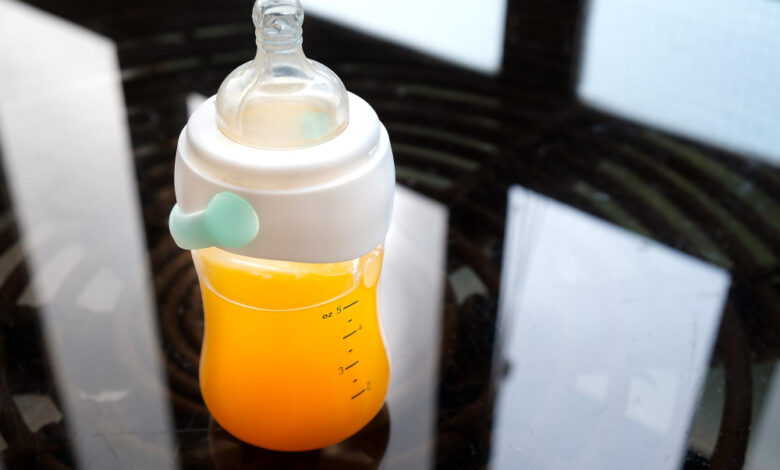Glass Baby Bottles vs. Plastic Alternatives – What’s Best for Your Little One?

Choosing the right baby bottle is one of the first decisions you’ll make for your newborn, and it can often feel overwhelming. The debate between glass and plastic baby bottles isn’t new, but today’s eco-conscious parents are presented with modern options that promise safety and sustainability. But are glass baby bottles truly the better choice, or are premium plastic alternatives just as viable? Let’s explore the factors that matter most to help you make an informed decision.
The Rise of Glass Baby Bottles
Glass baby bottles have been around for centuries, long before plastic became a common alternative. In recent years, they have experienced a resurgence in popularity, largely due to growing environmental concerns and health consciousness among parents. Glass is naturally free from harmful chemicals like BPA, phthalates, and PVC, which can be found in some plastic bottles.
With the ability to withstand high temperatures, glass bottles are ideal for sterilization, ensuring a safe and hygienic feeding experience. Additionally, their durability means glass bottles can last through multiple children, reducing waste and promoting sustainability.
Safety First – Glass vs. Plastic
When it comes to safety, glass bottles have a clear advantage over plastic. Many plastic bottles contain chemicals that could potentially leach into liquids, especially when heated. Glass, being non-toxic, eliminates this concern entirely.
However, the risk of breakage is a valid concern with glass bottles. Modern innovations have addressed this issue with tempered glass and silicone sleeves, making them more resistant to drops and bumps. While glass can still break, these advancements have made them a safer choice for everyday use.
Plastic bottles also have safety measures, such as being made from BPA-free materials. Yet, some parents remain cautious due to the potential for other chemicals and microplastics to leach, especially with frequent use and wear.
Environmental Impact of Baby Bottles
For environmentally-conscious parents, the sustainability of glass versus plastic is a significant consideration. Glass bottles are inherently eco-friendly as they are recyclable and have a longer lifespan than plastic. They don’t contribute to the growing problem of plastic pollution, making them a more sustainable choice.
Plastic bottles, despite being labeled as recyclable, often don’t end up being recycled due to contamination or lack of facilities, adding to the environmental burden. Glass bottles, on the other hand, can be reused, repurposed, or recycled without degrading in quality.
The Practicality of Glass Baby Bottles
Glass bottles, though heavier, offer a host of practical benefits. They maintain liquid temperatures better than plastic, keeping milk warm for longer periods. This feature can be particularly helpful for late-night feedings or on-the-go parents.
Some parents find the weight of glass bottles reassuring, as it prevents tipping and spills. The transparency of glass also allows parents to easily monitor the contents, ensuring proper measurement and cleanliness.
Nonetheless, carrying around glass bottles might not be as convenient as lightweight plastic ones, especially for active families. It’s essential to balance practicality with your personal lifestyle needs.
Durability Concerns – A Real Worry?
The fear of breakage is the most common concern associated with glass bottles. However, manufacturers have made significant strides in addressing this issue. Tempered glass is toughened through a controlled process, making it much more resistant to breaking.
Silicone sleeves have become a popular accessory, providing an added layer of protection and insulation. They come in various colors and designs, adding a fun and functional element to glass bottles.
While glass is inherently more fragile than plastic, with the right precautions and accessories, it can be just as durable. Dropping a glass bottle might still result in a break, but these modern enhancements significantly reduce the risk.
Health Benefits of Glass Baby Bottles
For parents prioritizing their baby’s health, glass bottles are an appealing choice. They are hypoallergenic and free from harmful chemicals, ensuring that your baby’s milk or formula remains pure and uncontaminated.
Glass doesn’t retain odors or stains, so you won’t have to worry about lingering smells or discoloration, which can be common in plastic bottles. This quality ensures that your baby feeds from a clean container every single time.
For parents with babies who have allergies or sensitivities, glass bottles can provide peace of mind, knowing that they aren’t introducing any potential irritants.
Real Parents Share Their Experiences
Hearing from other parents can provide invaluable insights when making parenting decisions. Many parents who have switched to glass bottles rave about their quality and safety.
One parent shared, “I was hesitant about using glass bottles at first, but the silicone sleeves made them so much easier to handle. I love that I don’t have to worry about any chemicals leaching into my baby’s milk.”
Another shared, “The peace of mind knowing that my baby’s bottle is totally clean and chemical-free is worth it for me. Plus, they’re surprisingly durable with the right covers.”
These firsthand experiences highlight the growing popularity of glass bottles among parents who value safety and sustainability.
Cost Considerations – Is Glass Worth It?
Glass bottles often come with a higher price tag compared to plastic. However, their durability and longevity can offset the initial investment, especially if you plan to use them for multiple children.
While premium plastic bottles are available, they may need to be replaced more frequently due to wear and tear, which can add up over time. Glass bottles, with their long-lasting nature, might be more cost-effective in the long run.
Considering the potential health benefits and environmental impact, many parents find that the cost of glass bottles is justified.
Making the Transition – Tips for Parents
If you’re considering making the switch to glass bottles, there are a few tips to ensure a smooth transition. Start by introducing one or two glass bottles into your routine and see how they fit with your lifestyle.
Invest in silicone sleeves to protect against breakage and to make handling easier. This small addition can make a significant difference in usability.
For parents concerned about the weight, try brands known for their lightweight designs. Plenty of options offer a balance between sturdiness and portability.
Are Premium Plastic Alternatives a Viable Option?
While glass bottles have their advantages, premium plastic alternatives shouldn’t be dismissed entirely. Many parents prefer the lightweight and shatterproof nature of plastic bottles, especially for travel.
Brands offering BPA-free and phthalate-free plastic bottles have worked to minimize health concerns. These bottles are often designed for convenience, with features like easy-to-clean vents and ergonomic shapes.
Ultimately, the choice between glass and plastic comes down to personal preference and priorities. For some parents, the flexibility and convenience of plastic are hard to beat.
Finding the Right Balance
When choosing between glass and plastic baby bottles, it’s important to find a balance that aligns with your family’s needs and values. Both options have their pros and cons, and what works for one family might not work for another.
Consider factors such as your lifestyle, your baby’s specific needs, and your environmental impact when making your decision. It might be helpful to experiment with both options to see which suits your family best.
Remember, the goal is to ensure your baby’s safety and comfort, so whichever choice you make, prioritize those aspects above all else.
Conclusion
In the great debate of glass baby bottles vs. plastic alternatives, there isn’t a one-size-fits-all answer. Glass bottles offer undeniable benefits in terms of health and sustainability, while premium plastic options provide unmatched convenience and practicality.





